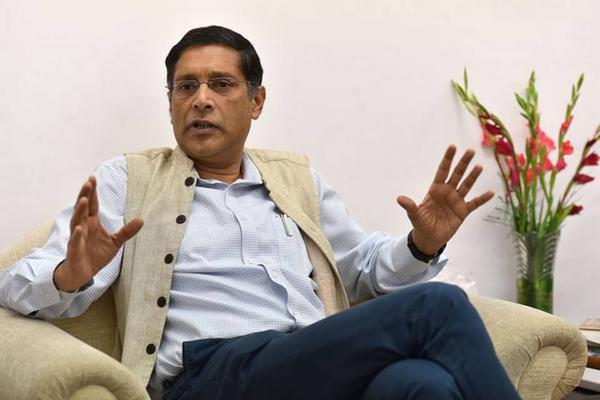New Delhi: In the midst of a government-Reserve Bank of India (RBI) tussle over utilisation of capital reserves of the central bank, former Chief Economic Advisor Arvind Subramanian strongly supports the government’s view, saying the RBI is holding excess capital between Rs 4.5 and Rs 7 lakh crore which should be used to recapitalise the banks.
However, he adds that deploying capital is a decision for the RBI to take which it must do “voluntarily and proactively without even the whiff of interference from outside”.
Subramanian says he realises that in making this suggestion he is up against all the eminent current and former RBI officials, who argue that the RBI actually needs all the capital it has, but they are wrong.
“These officials command the respect of the public, and for good reasons. I think they are wrong. As Margaret Thatcher used to say, ‘One man and the Truth is a majority’,” the noted economist says in his upcoming book “Of Counsel: The Challenges of the Modi-Jaitley Economy”, published by Penguin.
“It is almost certainly the case that more money will be needed to make banks healthy… It is possible that the government will need to provide anywhere between Rs 3-5 lakh crore — in addition to the amounts already spent — to restore the fundamentally viable public sector banks to health,” Subramanian says.
He adds that there is only one public-sector entity — RBI — that has a strong enough balance sheet to deploy this magnitude of resources.
“Conservative estimates (as well as cross-country comparisons) based on our internal analysis suggest that if the RBI were to adopt the practices of most major central banks around the world in deciding how much capital is necessary, it would find that it has about Rs 3-4 lakh crore of excess government capital, some of which it could deploy for the clean-up,” he says.
Subramanian adds that RBI is an outlier among major central banks, holding about 28 per cent in capital, which is the fifth-largest amongst all major central banks, with two of the four above India in this ranking being oil exporters, which are special cases being highly vulnerable to the swings in the price of petroleum.
He says the RBI calculates risk based on a sample that almost no other central bank does and has set for itself a risk tolerance that is “ultra, ultra conservative, almost bordering on paranoia”.
“Whereas other central banks want to cushion against events with one per cent probability of occurring, the RBI wants to cushion against events that can occur with .001 per cent probability.”
“…Prima facie, then, it seems that the RBI is holding too much capital… Our estimate is that the RBI is holding excess capital between Rs 4.5-7 lakh crore… This excess capital should be redeployed, shifted from where it is not needed and put instead where it is needed urgently, namely, in public-sector banks,” he says.
However, he warns that any redeployment of RBI capital must be seen not as a government demand but as a voluntary commitment of the RBI for the greater good, and should be done only after extensive consultation.
“If there is one strong balance sheet and one weak, there is no good reason the former should not come to the rescue of the latter. We build up strength in balance sheets not for strength’s sake but to use that strength. Savings are meant for rainy days and when rainy days come, savings should be run down.
“During and after the global financial crisis, major central banks across the world have lent the heft of their balance sheets to pull economies out of dire economic circumstances,” the former CEA says.
He adds the legitimacy of central banks is enhanced when they take actions to address serious problems. “When reputations and strong balance sheets are put on the frontline in service of the economy, these assets, far from getting depleted, are actually replenished.”
–IANS


















